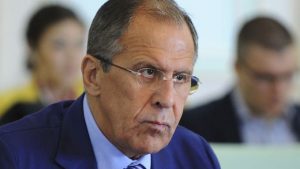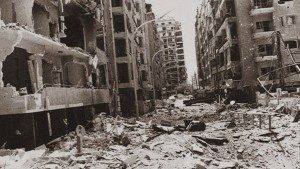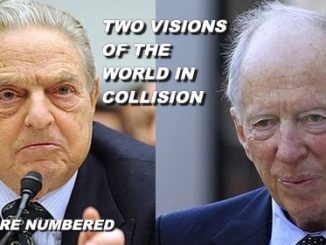
What Makes the West Reject Russia’s Syria Reconstruction Initiative?
PETER KORZUN
 Russian Foreign Minister Sergey Lavrov (pictured) has claimed that the UN is deliberately obstructing the process of Syria’s reconstruction. According to him, that organization’s political affairs department sent out a secret directive to UN agencies banning participation in any efforts to reboot the Syrian economy. The document states that all contributions should be limited to humanitarian aid only. The UN Security Council (UNSC) was not made aware of the directive.
Russian Foreign Minister Sergey Lavrov (pictured) has claimed that the UN is deliberately obstructing the process of Syria’s reconstruction. According to him, that organization’s political affairs department sent out a secret directive to UN agencies banning participation in any efforts to reboot the Syrian economy. The document states that all contributions should be limited to humanitarian aid only. The UN Security Council (UNSC) was not made aware of the directive.
In case anyone has forgotten, that letter was distributed last October when the position of Under-Secretary-General for Political Affairs was held by US diplomat Jeffrey Feltman. This is the first time Moscow has publicly questioned the UN Secretary-General’s real authority over the UN agencies. The directive contradicts UN Security Council Resolution 2254 that was adopted in 2015, paragraph 14 of which “[u]nderscores the critical need to build conditions for the safe and voluntary return of refugees and internally displaced persons to their home areas and the rehabilitation of affected areas.”
According to Sergey Lavrov, the US and its Western allies are making assistance contingent upon a political transition process that limits the reconstruction efforts to only the areas under their control. On July 28, Russia raised the issue of Syria’s reconstruction at the council. The Western UNSC members refused to cooperate. On Aug. 15, US Secretary of State Pompeo and UN Special Envoy de Mistura met in Washington to agree that “that any discussion of reconstruction was premature” before a political resolution could be found.
 Moscow is urging the EU to contribute financially to the reconstruction of that war-torn nation in order to stem the flow of refugees to Europe. The return of about six million Syrians to areas where fighting has ended and conditions are improving would help to ease the burden on Europe and other countries. Before meeting German Chancellor Angela Merkel on Aug. 18, Russian President Vladimir Putin called on European countries to help rebuild Syria so that Syrian refugees could return home, thus mitigating the migrant crisis. The issue is a huge headache for the Europeans, but their contribution to Syria’s reconstruction has added up to zilch.
Moscow is urging the EU to contribute financially to the reconstruction of that war-torn nation in order to stem the flow of refugees to Europe. The return of about six million Syrians to areas where fighting has ended and conditions are improving would help to ease the burden on Europe and other countries. Before meeting German Chancellor Angela Merkel on Aug. 18, Russian President Vladimir Putin called on European countries to help rebuild Syria so that Syrian refugees could return home, thus mitigating the migrant crisis. The issue is a huge headache for the Europeans, but their contribution to Syria’s reconstruction has added up to zilch.
The migrant exodus from Syria has become a pressing problem for the neighboring states. There are about 3.5 million refugees in Turkey, 1.5 million in Lebanon, 670,000 in Jordan, and 250,000 in Iraq. Russia is cooperating with Jordan and Lebanon on the issue. After his meeting with Sergey Lavrov, Lebanese Foreign Minister Gebran Bassil said the refuges could start returning right now, without waiting for a political settlement. Jordan is weighing Russia’s plan to repatriate 150,000 Syrians from Jordan by the end of 2018. The proposal includes the establishment of a center near the border with Syria to process the paperwork. Moscow is doing its best to normalize the situation — after all, the Western countries are not the only ones who can contribute to the problem’s solution, and the UN Refugee Agency is not an instrument designed to carry out their political will.
In late July, Turkish President Recep Erdogan came up with a political initiative to arrange a summit on Syria that would draw in Russia, Turkey, France, and Germany. He even set the date — September 7. The  prospects for such a summit were discussed during the meeting between the Russian and Turkish foreign ministers in Ankara, Aug. 13-14. But the only discussions on Syria mentioned during President Putin’s visit to Germany and his talks with the chancellor on Aug. 18 were those at a lower level — between experts on the region. On Aug. 17 the Russian press quoted Kremlin spokesman Dmitry Peskov’s claim that no four-nation summit will take place. One can only guess what happened, but one thing is certain — neither Ankara nor Moscow wants to be held responsible for any failure.
prospects for such a summit were discussed during the meeting between the Russian and Turkish foreign ministers in Ankara, Aug. 13-14. But the only discussions on Syria mentioned during President Putin’s visit to Germany and his talks with the chancellor on Aug. 18 were those at a lower level — between experts on the region. On Aug. 17 the Russian press quoted Kremlin spokesman Dmitry Peskov’s claim that no four-nation summit will take place. One can only guess what happened, but one thing is certain — neither Ankara nor Moscow wants to be held responsible for any failure.
In a nutshell, there will be no Western participation in the reconstruction efforts until there is some progress in the political process, which actually implies that Bashar Assad should go. But the West has not done anything to make such a political process possible. The UN-brokered talks in Geneva have remained hopelessly stymied, while the Astana process initiated by Russia, Turkey, and Iran has made gains, making it possible to establish extensive areas of ceasefire, among other achievements.
In January, the Russian resort city of Sochi hosted the Syrian National Dialogue Congress, which Moscow organized to bring Syrians of every stripe together at a round table to discuss the country’s future. It has led to the formation of the Constitutional Review Commission.
Whether Assad or someone else will lead the country is up to the Syrians, not the Americans or the Europeans, to decide. The peace efforts of Russia and its allies in Syria — Turkey and Iran — have brought about tangible results. Some refugees are beginning to return from exile back to their home country — still only a trickle, but it is a beginning. Europeans have a lot to gain by contributing to the reconstruction efforts in Syria and thus easing their own local refugee burdens. For instance, the return of refugees to Syria would have boosted the popularity of German Chancellor Angela Merkel, who is on shaky ground back home. The EU’s attitude toward the reconstruction of Syria is another example of how Europe is sacrificing its national interests to please the United States.
************
Original article
ER recommends other articles by Strategic Culture Foundation




